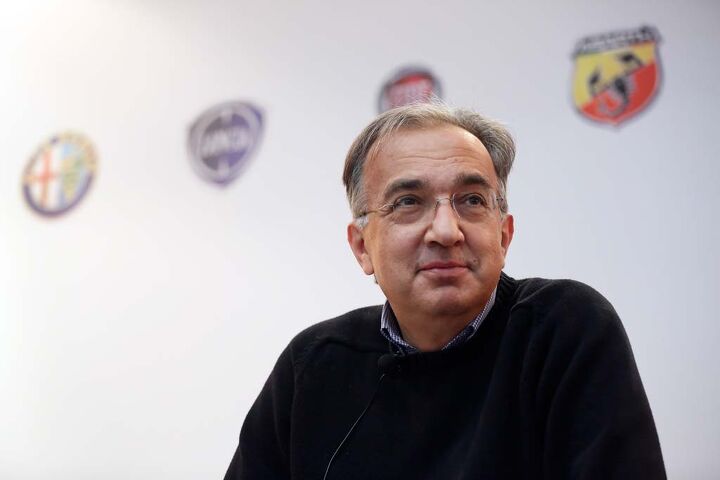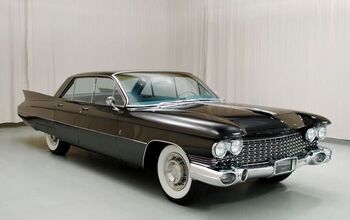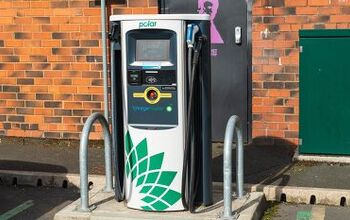Fields Are Fertile For Now, But Marchionne Has a Long View

Farmers are the ultimate craftsman when it comes to small-scale production. The level of management needed to stay competitive and above the high water line is, simply put, astounding. Consolidation in certain areas of agriculture has lead to factory farming, the widespread adoption of automation and genetically modified seeds that keep seed producers competitive. Private farmers are constantly at war with the market and their own budgets.
The agriculture industry has wholly transformed itself over the last 100 years. The automotive industry, which has only really existed for that same period of time, has seen similar levels of change. We are now building more cars, trucks, SUVs, crossovers, trikes and quadracycles than ever before, just like we are growing more food than we’ve ever seen in human history.
But, there’s one major stumbling block ahead — and Sergio Marchionne sees it.
Marchionne, at this point in his tenure as CEO of one of the largest automobile manufacturers in the world, is a farmer with a cliff-side plot of land. He’s also the only farmer in his town with a massive debt bill to pay and no cash on hand to clear the ledger.
The reality of farming is, at the point of sale, the vast majority of consumers couldn’t care less where their produce is grown. On a macro level, produce buyers will purchase strawberries in the middle of winter, even if they are grown in Mexico. Locally, during in-season months, as long as those strawberries are juicy and ripe, produce buyers don’t check the label to figure out where they were grown. Sure, there are those who buy organic, gluten-free options at the grocery store — and they are a statistically significant in their numbers to deserve a whole aisle devoted to their tastes — but the rest of us are completely apathetic.
The same goes for cars.
Car enthusiasts — us folks who write, comment, drive, wrench on, wash and generally love our cars — are one percent of the overall consumer market. The other 99 percent of people are totally agnostic to the efforts of automotive research, engineering, manufacturing and branding, with a few exceptions for those who want to “Buy American!” or some other loyalties of varying degrees. Enthusiasts do buy a very specific type of product, and automakers are more than willing to provide those products to the degree they are demanded on the market, but we still only get a single aisle in a vast dealer lot.
Corn enthusiasts, if there is such a thing, might see the agriculture industry thusly:
“The General Farms corn stays fresh much, much longer than the new American-Italian corn from Marchionne Farms,” a connoisseur of corn might say.
“But, the Marchionne Farms’ Hellcat Corn tastes better,” an equally loyal corn enthusiast might rebuff.
The other 99 percent of corn buyers are, well, not talking about corn. They don’t care where it comes from. They don’t care who made it. They look at the corn in the produce aisles, figure out the best deal for their needs, and buy the corn that makes the most sense — a combination of number of ears of corn and how much it costs. All the while, corn enthusiasts are trying to push their corn consuming friends one way or another. Sometimes they succeed in their suggestions, but not enough to make a real market impact. (See: SKYACTIV Corn.)
Standing at the cliff’s edge of his farm, Marchionne — with a hefty bank note on his mind — has an epiphany: Why am I spending all this money growing different corn than my neighbor? The components of corn — the cob, kernels and the way it’s packaged — are essentially the same. How you dress it up and sell it, that’s the only real difference!
But, it isn’t the sameness of corn — or automobiles — that’s the real issue here.
In probably a distant future, we aren’t going to need corn. We will plug some instructions into a machine, a whirring sound will emanate, and a meal will be replicated for consumption. You won’t need to own the food replicator. Instead, you will pay a fee to use it that’s magnitudes less than the current cost of food. The farm as we know it will be a thing of the past.
Automakers are staring down the barrel of a similar fate.
Google and automakers themselves are developing fully autonomous vehicles to be used by the masses. Their solutions are similar to the food replicator of the future: plug in a destination, a whirring sound will emanate and you’ll arrive at your destination. You won’t need to own the autonomous car of the future. Instead, you will pay a fee to use it that’s magnitudes less than the current cost of personal transportation. The car as we know it will be a thing of the past.
The autonomous car is the ocean lapping against the cliff’s edge, slowly — but with increased intensity — swallowing Marchionne’s farm.
Now, please, don’t get me wrong. I am in no way saying that the things we love — cars as we know them today — will be gone next year or even in the next 20 years. There might be a few companies still catering to the enthusiast, offering cars as artisanal luxury good for those of us who enjoy the speed and knowledge needed to pilot just such a machine. But the days of the automobile as a privately owned consumer necessity are numbered. Those who enjoy the act of driving will be the gasoline-fed hipsters of tom0rrow.
Marchionne, I assume, knows this. The day his farm is needed is coming to an end. But not today. Today there’s corn to grow and money to be made, and he’s looking at his neighbor at General Farms that grows the same crop.
Farmer Barra, let’s grind some corn together, shall we?

More by Mark Stevenson
Latest Car Reviews
Read moreLatest Product Reviews
Read moreRecent Comments
- Urlik You missed the point. The Feds haven’t changed child labor laws so it is still illegal under Federal law. No state has changed their law so that it goes against a Federal child labor hazardous order like working in a slaughter house either.
- Plaincraig 1975 Mercury Cougar with the 460 four barrel. My dad bought it new and removed all the pollution control stuff and did a lot of upgrades to the engine (450hp). I got to use it from 1986 to 1991 when I got my Eclipse GSX. The payments and insurance for a 3000GT were going to be too much. No tickets no accidents so far in my many years and miles.My sister learned on a 76 LTD with the 350 two barrel then a Ford Escort but she has tickets (speeding but she has contacts so they get dismissed or fine and no points) and accidents (none her fault)
- Namesakeone If I were the parent of a teenage daughter, I would want her in an H1 Hummer. It would be big enough to protect her in a crash, too big for her to afford the fuel (and thus keep her home), big enough to intimidate her in a parallel-parking situation (and thus keep her home), and the transmission tunnel would prevent backseat sex.If I were the parent of a teenage son, I would want him to have, for his first wheeled transportation...a ride-on lawnmower. For obvious reasons.
- ToolGuy If I were a teen under the tutelage of one of the B&B, I think it would make perfect sense to jump straight into one of those "forever cars"... see then I could drive it forever and not have to worry about ever replacing it. This plan seems flawless, doesn't it?
- Rover Sig A short cab pickup truck, F150 or C/K-1500 or Ram, preferably a 6 cyl. These have no room for more than one or two passengers (USAA stats show biggest factor in teenage accidents is a vehicle full of kids) and no back seat (common sense tells you what back seats are used for). In a full-size pickup truck, the inevitable teenage accident is more survivable. Second choice would be an old full-size car, but these have all but disappeared from the used car lots. The "cute small car" is a death trap.


































Comments
Join the conversation
I think that many would prefer to pay for a service and get a new vehicle every few years. Many of my neighbors don't keep their vehicles very long. I am one of the few who has kept a vehicle as long as 18 years which amazes many who think that 5 years is too long. I myself would prefer to buy and keep but with vehicle leasing becoming more popular and with maintenance for the first few years included on many new vehicles I can see a progression into a pay for a service providing a new vehicle on a recurring basis becoming the next big thing offered by the manufacturers. This would keep the demand for vehicles steady.
By the way consumers are a bit unpredictable. Prepackaged food has been the norm for decades giving huge profits to large food conglomerates. But in the last 5 years consumer trends have changed and more people seem to care. And it's not just the hippies Campbells for instance feels it will cause them huge problems in the near future.